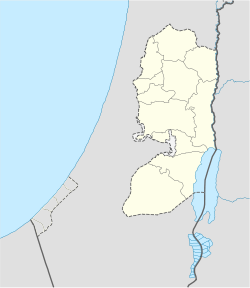| Murder of Dalia Lemkus | |
|---|---|
| Location | Alon Shvut November 10, 2014 |
| Date | November 10, 2014 |
Attack type | Vehicle-ramming attack, stabbing |
| Weapon | Knife, vehicle |
| Deaths | Dalia Lemkus |
| Injured | 2 |
| Perpetrator | Maher al-Hashlamun |
This article may be excessively based on contemporary reporting.(March 2024) |
The 2014 Alon Shvut stabbing attack occurred on 10 November 2014, when Palestinian Maher al-Hashlamun first attempted to run his vehicle into a crowd waiting at the bus/hitch-hiking station at the entrance to the Israeli settlement of Alon Shvut, in the Gush Etzion section of the occupied West Bank, then, when the car was stopped by a bollard, got out and attacked with a knife, killing a young woman and wounding two others. The attack occurred four hours after the killing of Sergeant Almog Shiloni in Tel Aviv and took place at the same bus/hitch-hiking stop where three Israeli teenagers were kidnapped and murdered in June 2014. [1] [2] [3] [4]

